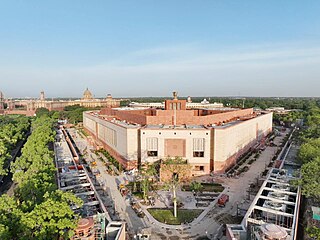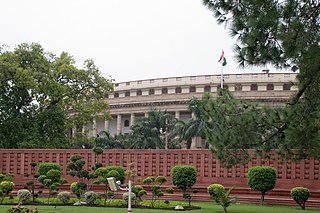Parliament House, New Delhi, may refer to:
- Old Parliament House, New Delhi, completed in 1927
- New Parliament House, New Delhi, completed in 2023
Parliament House, New Delhi, may refer to:

The prime minister of India is the head of government of the Republic of India. Executive authority is vested in the prime minister and his chosen Council of Ministers, despite the president of India being the nominal head of the executive. The prime minister is often the leader of the party or the coalition with a majority in the lower house of the Parliament of India, the Lok Sabha, which is the main legislative body in the Republic of India. The prime minister and their cabinet are at all times responsible to the Lok Sabha.

New Delhi is the capital of India and a part of the National Capital Territory of Delhi (NCT). New Delhi is the seat of all three branches of the Government of India, hosting the Rashtrapati Bhavan, Sansad Bhavan, and the Supreme Court. New Delhi is a municipality within the NCT, administered by the NDMC, which covers mostly Lutyens' Delhi and a few adjacent areas. The municipal area is part of a larger administrative district, the New Delhi district.
Old Parliament House or Old Parliament Building may refer to:

The Parliament of India is the supreme legislative body of the Republic of India. It is a bicameral legislature composed of the Rajya Sabha and the Lok Sabha. The President of India, in their role as head of the legislature, has full powers to summon and prorogue either house of Parliament or to dissolve the Lok Sabha, but they can exercise these powers only upon the advice of the Prime Minister and their Union Council of Ministers.
Parliament building and variations may refer to:

The Government of India, also known as the Union Government, the Central Government or simply the Centre, is the national authority of the Republic of India, a federal democracy located in South Asia, consisting of 28 union states and eight union territories.

The Bharat Rashtra Samithi, formerly known as Telangana Rashtra Samithi is an Indian political party which is predominantly active in the state of Telangana. It was founded on 27 April 2001 as by K. Chandrashekar Rao, with a single-point agenda of creating a separate Telangana state with Hyderabad as its capital. It has been instrumental in carrying forth a sustained agitation for the granting of statehood to Telangana.

The 14th Lok Sabha was convened after the 2004 Indian general election held in four phases during 20 April – 10 May 2004, which led to the formation of first Manmohan Singh ministry (2004–2009). Indian National Congress-led United Progressive Alliance won 62 more seats than previous 13th Lok Sabha. The Lok Sabha is the lower house in the Parliament of India. 8 sitting members from Rajya Sabha, the Upper House of Indian Parliament, were elected to 14th Lok Sabha after the 2004 Indian general election.
Parliament House may refer to:
Grewal or Garewal is a family name historically used in India and Pakistan as a gotra (clan) of Jat people.
New Parliament House may refer to:

The 2001 Indian Parliament attack was a terrorist attack on the Parliament of India in New Delhi, India on 13 December 2001. The attack was carried out by five armed assailants and has resulted in the deaths of six Delhi Police personnel, two Parliament Security Service personnel, and a gardener. All the five attackers were killed by security forces.

Jagmohan Malhotra, known by the mononym Jagmohan, was an Indian civil servant and politician. After working with the Indian National Congress, he joined the Bharatiya Janata Party in 1995. He served as Lieutenant Governor of Delhi and Goa, as the 5th Governor of Jammu and Kashmir, and for three terms as Member of Parliament for New Delhi. In the cabinet, he served as Union Minister for Urban Development and Tourism.
New Delhi is the capital city of India.

A union territory is a type of administrative division in the Republic of India. Unlike the states of India, which have their own governments, union territories are federal territories governed, in part or in whole, by the Union Government of India. There are currently eight union territories in India, namely Andaman and Nicobar Islands, Chandigarh, Dadra and Nagar Haveli and Daman and Diu, Delhi, Jammu and Kashmir, Ladakh, Lakshadweep and Puducherry.
Sunita Kohli is an Indian interior designer, architectural restorer and furniture manufacturer. She had restored and decorated Rashtrapati Bhavan, Parliament House Colonnade (1985–1989), the Prime Minister's Office and Hyderabad House in New Delhi.
Subhash C. Kashyap is a former Secretary-General of 7th Lok Sabha, 8th Lok Sabha and 9th Lok Sabha and Lok Sabha Secretariat from 1984 to 1990. He is also a well known political scientist, an expert in the Indian Constitution, Constitutional Law, Parliamentary Experts and a distinguished scholar. He also headed an International Centre for Parliamentary Documentation, IPU at Geneva till 1983. Kashyap was Honorary Constitutional Advisor to the Government of India on Panchayati Raj Laws and Institutions. He is also Recipient of several prestigious awards for the Best Books in Constitution, Law and Political Science. At present Dr. Kashyap is an Honorary Research Professor at the Centre for Policy Research (CPR), New Delhi. He was also a Member of the National Commission to Review the Working of Constitution and Chairman of its Drafting and Editorial Committee.
Savita Behen (1919-2009) was an Indian politician, social worker, educationist and a former member of Rajya Sabha, the upper house of the bicameral Indian Parliament. She was known to be an advocate of women empowerment and gender equality and was listed among the 3300 distinguished living women of the world by the Council for Parity Democracy in 1990. She was honoured by the Government of India in 1971 with Padma Shri, the fourth highest Indian civilian award.

Member of Parliament (MP) in India refers to persons who serve in the Parliament of India. These include:
Central Vista Redevelopment Project refers to the ongoing redevelopment to revamp the Central Vista, India's central administrative area located near Raisina Hill, New Delhi. The area was originally designed by Edwin Lutyens and Herbert Baker during British colonial rule and was retained by the Government of India after independence.